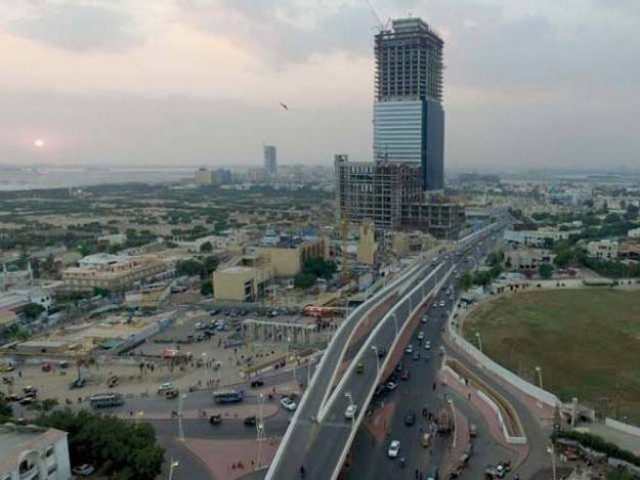Cities in Pakistan planned for rich housing
Run by inept planners, there is no zoning for commerce, education, public space and poverty

Run by inept planners, there is no zoning for commerce, education, public space and poverty PHOTO: AFP
“About 70% of today’s Pakistan is urban in terms of population density,” concluded urbanist Reza Ali in a study based on satellite imaging.
Officialdom, however, continues to believe that 36% of the population lives in cities and towns. This anomaly is attributed to a definitional problem – as the census definition of ‘urban area’ was changed between 1971 and 1998 – limiting it to just places administratively incorporated as municipalities of some kind.
‘Karachi heading towards point of no return’
According to the World Population Review 2016, there are eight cities in urbanised Pakistan with a population of over 1 million. There are about seven cities with a population of 500,000 to 1 million and there are around 51 cities with a population between 100,000 and 500,000.
Elsewhere in the world cities with population of over 100,000 are powerhouses of growth and employment. In such cities, commerce and industry thrive. They are like a magnet to the poor, providing them with an opportunity to enter middle-class employment.
But not so in Pakistan; here we examine why not.
Pakistani cities are identity-less as they are like any element of self-governance.

Half of each city is bureaucratically run by young, inexperienced civil servants who neither have the background to run such large cities nor the commitment to learn about their management, since their average tenure is about a couple of years.
For historical reasons, the other half of our cities is run by an army general, who too, like the bureaucracy, knows nothing of city management.
The people have no say in running their own cities. Nor is there any scope for visionary city management ever shaping the economy of these large powerhouses of growth.
Thus, our cities never attain their destiny. We argue they are an historical anomaly in that they provide no opportunity to anyone. City managers – both bureaucrats and generals – have favoured city designs that have no zoning for commerce, entrepreneurship, entertainment, public space, education and even poverty.
Karachi property prices soar after crime crackdown
All Pakistani cities have been zoned only for single family homes with negligible space for activities like education, entertainment, public space, offices and poor housing.
Retail is forced into tiny three-marla plots. There is no space for larger show rooms or department stores. City managers do not even have a concept of a warehouse. Not surprisingly, warehouses continue to be created in historic townhouses in the old city of Lahore.
In Lahore, for example, the housing units with single-family dwelling units constitute as much as 54% of the city; roads take 25%, parks 7%, public schools/buildings 5-10%, commercial 5% and graveyards 2%.
Till 2010, Lahore planners gave equal land to death and life – as graveyards and commercial areas (shopping, offices, entertainment, leisure, hotels) occupied same proportion of the city area.
But the Defence Housing Authority (DHA) now occupies as much as one-third area of the metropolitan Lahore that caters to only 150,000 residents.
Where will the poor go?
City space is required for all manners of activity as that is how people earn a livelihood and feed themselves. Employment needs retail, schooling, offices and public spaces.
City centres with thriving commerce is a dire economic need of our country. Yet, our city managers continue to plan for cars, rich single family houses while completely ignoring the economic needs of our people.
Recently, the Supreme Court directed Islamabad to end the practice of using houses for anything other than residences. The court blamed the businesses that were using houses and imposed a cost on them. They now have to move out and incur the loss of operating from a poor environment.
Inexperience, poorly constructed houses led to most heatwave deaths last year
The court should have taken expert testimony and forced city administration to change their obsession with rich housing.
In essence, the city managers are subsidising rich housing by holding back city development to maintain their idyllic existence on a bustling metropolis. Entrepreneurs who are yearning to set up businesses for the growing needs of a metropolis are being taxed.
If the court had seen the issue in this light, it would have enlightened city management. Now it has rewarded a subsidy to the rich.
History and civilisation move in cities. All major scientific, social, political, economic, and technological innovations have happened in human agglomerations called cities. The poor are not wrong in migrating from villages to cities; it is the city planners who are at fault for having failed to meet their demands.
Current zoning rules place an artificial lid on the wealth potential that these cities can generate through commerce, industry and entrepreneurship.
City zoning has to be deregulated, mixed zoning should be allowed, and height limitations must be relaxed to un-tap this wealth.
Ali Salman is the founder and executive director of PRIME Institute. Dr Nadeemul Haque is the former deputy chairman of the Planning Commission
Published in The Express Tribune, June 13th, 2016.
Like Business on Facebook, follow @TribuneBiz on Twitter to stay informed and join in the conversation.



















COMMENTS
Comments are moderated and generally will be posted if they are on-topic and not abusive.
For more information, please see our Comments FAQ